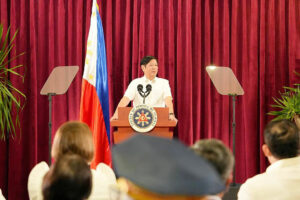Do you have anything (consequential) to say? How will you say it?

I was able to catch most of the presentation of Presidential candidate, Senator Panfilo “Ping” Lacson, and the question-and-answer portion of the Senator’s appearance at the FINEX (Financial Executives Institute of the Philippines) webinar “Presidentiable Series: Economic Reform in the New Frontier.” The title of the webinar, designed obviously to catch one’s attention and sound compelling to rightly bring in the crowd, immediately drew the boundaries of the discussion. No politics, all economics, even if one affects the other in many ways.
Since the metes and bounds were clearly defined, Mr. Lacson focused, with discipline, on his proposed economic program, in accordance with the Lacson-Vicente Sotto campaign strategy of presenting one’s programs of action and avoiding attacks or even expressing critical judgment on sins of character and sins of administration. This decision by the team of presidential and vice-presidential aspirants and their handlers is deliberately designed to avoid bare knuckle political fist fights in which opposition groups normally engage to create a clear alternative between them and the powers that be. In addition, this attack, attack mode creates a macho image which, in the case of Lacson, has already been established and therefore need not be reinforced. The tandem’s handlers figure that people want to know what concrete and practical measures he will employ to solve our urgent problems.
The demeanor of Lacson throughout that two-hour Saturday evening FINEX webinar was consistent with his image and the message that was featured in the cover of the Oct. 25-Nov. 1 issue of Biz News Asia. It is interesting to note that the magazine’s cover story came close on the heels of the FINEX webinar, with Lacson telling host Mike Toledo that “he doesn’t mind being a guinea pig,” in reference to his being the first of the presidentiables to be featured in the FINEX series.
The magazine cover rattles off the message: “Panfilo Lacson and Tito Sotto Represent Law and Order, Vast Experience in the Executive and Legislative Branches of Government, Solid Track Records of Achievements, No Corruptions, and Matchless Celebrity Status.”
Lacson’s responses during the interview showed that Lacson has been absorbing all the possible implications, nuances, consequences, causes, issues, strategic implications of an issue and the interrelation between government agencies and the workings of the bureaucracy and the multi-dimensional nature of all the nation’s most serious problems. He went to school, so to speak, during his Senate stint and as head of the Philippine National Police. He observed how people and agencies work. He got to know the bureaucrats and the transient technocrats. He learned the so-called “logic of government” and its moving parts by participating in crucial Senate discussions and consultations with experts from academe and the professions. The only thing that needs to be clarified is his ideology: political (liberal democracy) and economic (free market, etc.) and, hand in hand with the latter, a clearly defined vision for the Philippines for the next six years. It will also be interesting to watch how much he will allow pragmatic or “tribal” politics and permit his base, constituency, and vested interests, to interfere with his presidential agenda.
Lacson’s views on the assistance that needs to be urgently extended to micro, small, and medium enterprises which have, based on the statistics he readily utters, borne the economic burden of the pandemic, together with jeepney drivers, small service businesses, and others similarly situated, show a grasp of the problem and priorities he has formulated.
The messages are clear, although I find interesting, it having somewhat come from left field, the “matchless celebrity status.” I think however that this message was surfaced to emphasize the popularity and charisma of the pair, and the Filipino penchant for “star” status of the artista or the super athlete. It’s playing to the “fan” or the star-struck in the Filipino.
Senator Manny Pacquiao will be appearing in forums identified with the AB audiences and business and industry groups which have never really been part of his milieu for most of his life, except when he became a multi-titled champion around 2008 and when he became congressman in 2010, the same year Benigno Aquino III or Noynoy/Pnoy became president. I remember arranging a meeting between Pacquiao and the then President-elect at the latter’s home in Times St. a few weeks before both men would formally assume office.
In that afternoon meeting, Congressman-elect Pacquiao, who had actively supported and campaigned for Mr. Aquino’s main opponent, exhibited the humility that eventually became one of his messages. Pacquiao pledged his support to the President-elect and showed his willingness to learn from Mr. Aquino, who had spent nine years in the Lower House. I recall Mr. Aquino advising the Pambansang Kamao on the budget process.
The main messages of Pacquiao seem to be: rise from extreme poverty to fame, a willingness to learn and thus overachieve, to having the concerns of the poor at heart since he himself was once poor, his humility, love of country, and religiosity.
For quite a number of people, these qualities have a certain appeal, especially among those weary of extra judicial killings, violence, graft and corruption, Chinese intrusions into the country’s territory, extreme partisanship, and general economic disparity and hardship.
People, especially the D and E classes, associate with Pacquiao’s folksy logic. When asked why he was giving away P1,000 bills in a recent sortie in the Southern Tagalog region, his response was, “I’ve been giving away money since 2016. It’s nothing new. It’s a practice I have. People are very hungry. They have nothing to eat. In fact, P1,000 is not enough.” If that doesn’t appeal to the impoverished who naturally think of the urgent immediate need, I don’t know what else will. Its Pacquiao’s own version of ayuda (financial aid) which predated the government’s pandemic ayuda.
His message of religiosity is further heightened by the support and guidance he gets from his Pastors and his Bible-study circle. There is, however, a tendency to carry this to the extreme when he is asked about details and plan of action to provide housing, jobs, education, health, nutrition, in general, achieving the common good, a biblical teaching. His response is “God will provide.”
We’re still a few days from Nov. 15, the final day for the finalization of candidacies for any elective post. When the final list comes out, expect realignments and, of course, modifications in messaging and communications strategy.
Philip Ella Juico’s areas of interest include the protection and promotion of democracy, free markets, sustainable development, social responsibility and sports as a tool for social development. He obtained his doctorate in business at De La Salle University. Dr. Juico served as secretary of Agrarian Reform during the Corazon C. Aquino administration.
![Photo of [B-SIDE PODCAST] The five challenges to Philippine competitiveness](https://redstateinvestings.com/wp-content/uploads/2022/07/07.11.22-B_Side_Competitive-300x300-Kjd5hI-300x220.jpeg)



